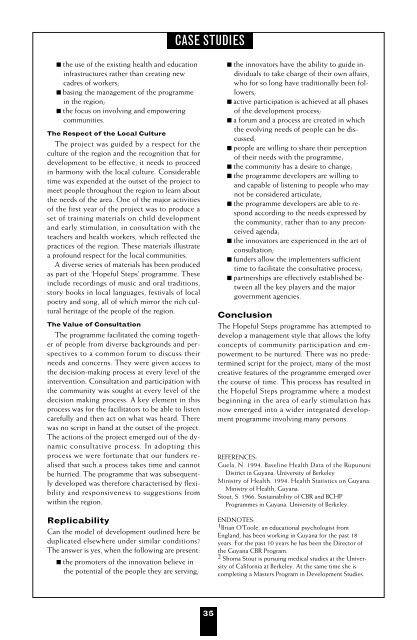Inclusive ECCD: - Consultative Group on Early Childhood Care and ...
Inclusive ECCD: - Consultative Group on Early Childhood Care and ...
Inclusive ECCD: - Consultative Group on Early Childhood Care and ...
You also want an ePaper? Increase the reach of your titles
YUMPU automatically turns print PDFs into web optimized ePapers that Google loves.
CASE STUDIES<br />
■ the use of the existing health <strong>and</strong> educati<strong>on</strong><br />
infrastructures rather than creating new<br />
cadres of workers;<br />
■ basing the management of the programme<br />
in the regi<strong>on</strong>;<br />
■ the focus <strong>on</strong> involving <strong>and</strong> empowering<br />
communities.<br />
The Respect of the Local Culture<br />
The project was guided by a respect for the<br />
culture of the regi<strong>on</strong> <strong>and</strong> the recogniti<strong>on</strong> that for<br />
development to be effective, it needs to proceed<br />
in harm<strong>on</strong>y with the local culture. C<strong>on</strong>siderable<br />
time was expended at the outset of the project to<br />
meet people throughout the regi<strong>on</strong> to learn about<br />
the needs of the area. One of the major activities<br />
of the first year of the project was to produce a<br />
set of training materials <strong>on</strong> child development<br />
<strong>and</strong> early stimulati<strong>on</strong>, in c<strong>on</strong>sultati<strong>on</strong> with the<br />
teachers <strong>and</strong> health workers, which reflected the<br />
practices of the regi<strong>on</strong>. These materials illustrate<br />
a profound respect for the local communities.<br />
A diverse series of materials has been produced<br />
as part of the ‘Hopeful Steps’ programme. These<br />
include recordings of music <strong>and</strong> oral traditi<strong>on</strong>s,<br />
story books in local languages, festivals of local<br />
poetry <strong>and</strong> s<strong>on</strong>g, all of which mirror the rich cultural<br />
heritage of the people of the regi<strong>on</strong>.<br />
The Value of C<strong>on</strong>sultati<strong>on</strong><br />
The programme facilitated the coming together<br />
of people from diverse backgrounds <strong>and</strong> perspectives<br />
to a comm<strong>on</strong> forum to discuss their<br />
needs <strong>and</strong> c<strong>on</strong>cerns. They were given access to<br />
the decisi<strong>on</strong>-making process at every level of the<br />
interventi<strong>on</strong>. C<strong>on</strong>sultati<strong>on</strong> <strong>and</strong> participati<strong>on</strong> with<br />
the community was sought at every level of the<br />
decisi<strong>on</strong> making process. A key element in this<br />
process was for the facilitators to be able to listen<br />
carefully <strong>and</strong> then act <strong>on</strong> what was heard. There<br />
was no script in h<strong>and</strong> at the outset of the project.<br />
The acti<strong>on</strong>s of the project emerged out of the dynamic<br />
c<strong>on</strong>sultative process. In adopting this<br />
process we were fortunate that our funders realised<br />
that such a process takes time <strong>and</strong> cannot<br />
be hurried. The programme that was subsequently<br />
developed was therefore characterised by flexibility<br />
<strong>and</strong> resp<strong>on</strong>siveness to suggesti<strong>on</strong>s from<br />
within the regi<strong>on</strong>.<br />
Replicability<br />
Can the model of development outlined here be<br />
duplicated elsewhere under similar c<strong>on</strong>diti<strong>on</strong>s?<br />
The answer is yes, when the following are present:<br />
■ the promoters of the innovati<strong>on</strong> believe in<br />
the potential of the people they are serving;<br />
■ the innovators have the ability to guide individuals<br />
to take charge of their own affairs,<br />
who for so l<strong>on</strong>g have traditi<strong>on</strong>ally been followers;<br />
■ active participati<strong>on</strong> is achieved at all phases<br />
of the development process;<br />
■ a forum <strong>and</strong> a process are created in which<br />
the evolving needs of people can be discussed;<br />
■ people are willing to share their percepti<strong>on</strong><br />
of their needs with the programme;<br />
■ the community has a desire to change;<br />
■ the programme developers are willing to<br />
<strong>and</strong> capable of listening to people who may<br />
not be c<strong>on</strong>sidered articulate;<br />
■ the programme developers are able to resp<strong>on</strong>d<br />
according to the needs expressed by<br />
the community, rather than to any prec<strong>on</strong>ceived<br />
agenda;<br />
■ the innovators are experienced in the art of<br />
c<strong>on</strong>sultati<strong>on</strong>;<br />
■ funders allow the implementers sufficient<br />
time to facilitate the c<strong>on</strong>sultative process;<br />
■ partnerships are effectively established between<br />
all the key players <strong>and</strong> the major<br />
government agencies.<br />
C<strong>on</strong>clusi<strong>on</strong><br />
The Hopeful Steps programme has attempted to<br />
develop a management style that allows the lofty<br />
c<strong>on</strong>cepts of community participati<strong>on</strong> <strong>and</strong> empowerment<br />
to be nurtured. There was no predetermined<br />
script for the project; many of the most<br />
creative features of the programme emerged over<br />
the course of time. This process has resulted in<br />
the Hopeful Steps programme where a modest<br />
beginning in the area of early stimulati<strong>on</strong> has<br />
now emerged into a wider integrated development<br />
programme involving many pers<strong>on</strong>s.<br />
REFERENCES:<br />
Guela, N. 1994. Baseline Health Data of the Rupununi<br />
District in Guyana. University of Berkeley<br />
Ministry of Health. 1994. Health Statistics <strong>on</strong> Guyana.<br />
Ministry of Health, Guyana.<br />
Stout, S. 1966. Sustainability of CBR <strong>and</strong> BCHP<br />
Programmes in Guyana. University of Berkeley.<br />
ENDNOTES:<br />
1 Brian O’Toole, an educati<strong>on</strong>al psychologist from<br />
Engl<strong>and</strong>, has been working in Guyana for the past 18<br />
years. For the past 10 years he has been the Director of<br />
the Guyana CBR Program.<br />
2 Shoma Stout is pursuing medical studies at the University<br />
of California at Berkeley. At the same time she is<br />
completing a Masters Program in Development Studies.<br />
35
















